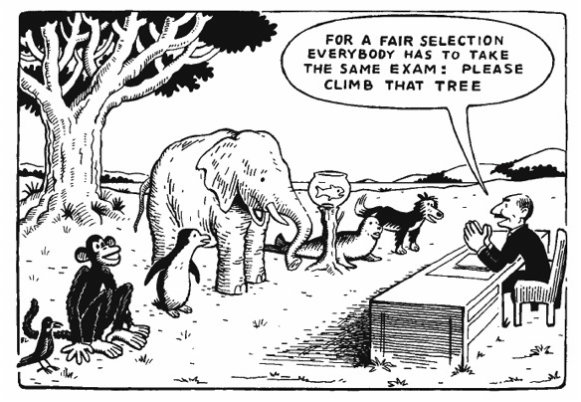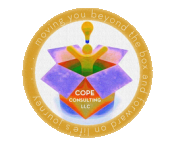
What are the educational and societal ramifications for comparing one individual to another? Children are born exuding their own unique sparkle and brilliance. Could all of our brilliant children be at risk for becoming ordinary unhappy adults because we try to fit them into a neat, tidy measurable box? This connects to a story that was once shared with me by one of my beloved mentors, Dr. Ashley Halliday. His story leans on our animal world to ponder these questions.
Sitting in an animal behavior class at Berkeley many years ago, and one of the students asked, "...So which is more intelligent, a dolphin or a dog?" And the instructor said, Remember that intelligence is a human construct. Right now, we think of intelligence in terms of a score on a test, called an IQ test. And we are all aware of shortcomings with that test in terms of cultural norms, population norms and things like that. So the real answer to your question is that a dog is much more intelligent at being a dog. And a dolphin is much more intelligent at being a dolphin."
Looking at the cartoon above we can see how silly it is to ask all animals to take the same test. The monkey would look brilliant climbing that tree in this context. The bird would look amazing as long as she was allowed to fly to the top. Unfortunately, the exam says that she has to climb. That poor elephant, wolf, penguin, and seal would be best to hang out and avoid being seen as their physical characteristics would inhibit them from even attempting such a feat. And then you have the unfortunate little fish that could lose his life by being asked to take such an inappropriate test.
Isn’t it silly that we ask all of our children to take the same standardized tests? If we continue to compare our youth to each other within the same context as the cartoon above illustrates, we will always have one that looks brilliant and another that looks striving. Could we be creating and perpetuating a self-fulling prophecy where one child leaves our educational system empowered and confident while another leaves hopeless and unsure of the gifts he/she has to share with the world? Even if a student leaves the system feeling confident based on their ability to pass a test, does that mean he/or she will be successful and happy in life?
If we neglect the importance of supporting and guiding our youth to realizing and building their strengths and interests, we may lose the opportunity to delight in the potential gifts they have to share with the world. As a community we can redefine our educational constructs so that they nurture, develop, and highlight unique interests, strengths and passions each brings to this world. These self-actualized, autonomous learners might then be empowered to do their part to make our world a better place.
Sitting in an animal behavior class at Berkeley many years ago, and one of the students asked, "...So which is more intelligent, a dolphin or a dog?" And the instructor said, Remember that intelligence is a human construct. Right now, we think of intelligence in terms of a score on a test, called an IQ test. And we are all aware of shortcomings with that test in terms of cultural norms, population norms and things like that. So the real answer to your question is that a dog is much more intelligent at being a dog. And a dolphin is much more intelligent at being a dolphin."
Looking at the cartoon above we can see how silly it is to ask all animals to take the same test. The monkey would look brilliant climbing that tree in this context. The bird would look amazing as long as she was allowed to fly to the top. Unfortunately, the exam says that she has to climb. That poor elephant, wolf, penguin, and seal would be best to hang out and avoid being seen as their physical characteristics would inhibit them from even attempting such a feat. And then you have the unfortunate little fish that could lose his life by being asked to take such an inappropriate test.
Isn’t it silly that we ask all of our children to take the same standardized tests? If we continue to compare our youth to each other within the same context as the cartoon above illustrates, we will always have one that looks brilliant and another that looks striving. Could we be creating and perpetuating a self-fulling prophecy where one child leaves our educational system empowered and confident while another leaves hopeless and unsure of the gifts he/she has to share with the world? Even if a student leaves the system feeling confident based on their ability to pass a test, does that mean he/or she will be successful and happy in life?
If we neglect the importance of supporting and guiding our youth to realizing and building their strengths and interests, we may lose the opportunity to delight in the potential gifts they have to share with the world. As a community we can redefine our educational constructs so that they nurture, develop, and highlight unique interests, strengths and passions each brings to this world. These self-actualized, autonomous learners might then be empowered to do their part to make our world a better place.
 RSS Feed
RSS Feed

